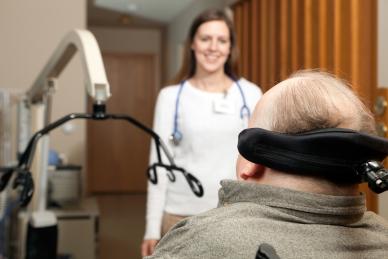In 2018, the MS Trust secured funding from The October Club, which enabled them to pilot a new role called an advanced MS champion (AMSC) within the NHS. The roles were located in Salford, Swansea, Cumbria, Poole, Norfolk and Bristol. The MS Trust is now delighted to release the findings from the programme, which included huge savings to the NHS, along with immeasurable benefits to people living with Advanced MS.
What is an Advanced MS Champion (AMSC)?
An advanced MS champion is a specialist health professional, either a nurse or a therapist, who works as part of the MS Team. They have highly specialised knowledge of the wide variety of needs someone living with advanced MS might have. Their role is to coordinate the care of people living with advanced MS, by working across teams and social care to deliver a joined-up care plan. They also provide specialist and individual care for people living with a complex set of symptoms.
Why are Advanced MS Champions needed?
It is estimated that more than 40,000 people in the UK have advanced MS. By establishing an AMSC within an NHS Trust’s MS team, capacity has been made to provide more care to people within their homes and within the community. This is vital as many people living with advanced MS have reported becoming lost to specialist services as they are unable to attend in person clinics and no longer qualify for disease modifying drugs (DMDs).
The AMSC role which includes attending home visits, offered a lifeline to this vulnerable cohort of people and was particularly important given the complex disabilities people with advanced MS live with. The AMSC's have been able to re-engage patients in this group with essential care. The new report from the MS Trust highlights that 10% of those referred by the AMSCs were people with advanced MS who had previously been lost to services.
Having an MS Champion in my life has helped and assisted me tremendously. I can discuss any issue with her, and she forwards it to the relevant person and my issue is dealt with efficiently and effectively. Having an MS Champion supporting me floods me with confidence to live my life - not just survive. Not all super heroes wear capes! – Maria, person with advanced MS
What were the results of the pilot scheme?
Areas which had an AMSC, saw a consistent reduction in the number of people with MS requiring two or more emergency hospital admissions during a 12-month period. On average, 52 hospital admissions per site per year were prevented, this equates to 403 emergency bed days and 91 MS Specialist Nurse appointments. Overall this amounts to a cost saving for the NHS of £465,378 annually per AMSC. Savings weren't limited to MS teams, the report also highlights that people living with advanced MS under the care of an AMSC, required 115 fewer GP appointments across the AMSCs caseload. This is a crucial saving when GPs are more stretched than ever before.
David Martin, CEO of the MS Trust said: “The pilot has shown that the AMSC role is not only financially viable but has significant cost savings for the NHS, improves patient flow, outcomes and patient experience for people with advanced MS and their families and has been greatly welcomed by other health and social care professionals. Crucially, the role helped to free up much needed hospital beds in each of the six areas.
These Champions are game changers for the NHS. With services under increased pressure, it is essential that policy makers in Government recognise the detrimental effect that advanced MS can have when not managed properly, something which is entirely avoidable. This is about coordinating services which are already in place to relieve pressure on local health care services and ultimately protecting the individual. Now more than ever, the NHS needs to find ways of joining up services which are already running well to save precious resource and the AMSC does exactly that.”




